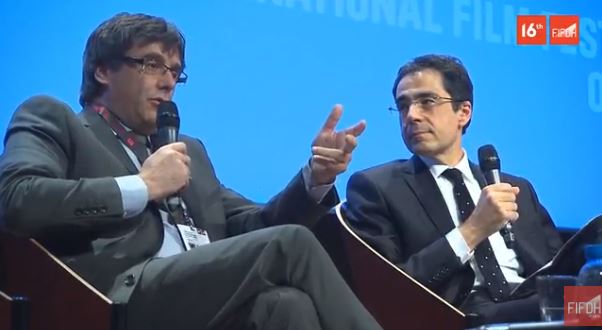19.03.2018 - 13:58
Police brutality against the Catalan 1-O independence referendum and the subsequent repressive attacks from the Spanish government have caused a flood of allegations of violation of fundamental rights in Catalonia. Organizations such as Amnesty International or Human Rights Watch have confirmed the violations. This week, the internationalization of the Catalan case reaches the UN headquarters in Geneva, where the Human Rights Council meets. Several debates and events on the present political situation in Catalonia have been organised, with president Carles Puigdemont as guest star.
The deposed president, currently in exile in Brussels, participated yesterday in a debate organised by the Human Rights Film Festival (FIFDH), one of the most prestigious in its category. He was accompanied on stage by Micheline Calmy-Rey, twice former president of Switzerland, vice president and Foreign Affairs minister (2003-2011); Catalan journalist Xavier Vidal-Folch; and Nicolas Levrat, professor at the Faculty of Law of the University of Geneva and director of the Global Studies Institute.
Peaceful movement, no resuts?
Puigdemont claimed that the Catalan peaceful revolution deserves an answer: “If the only way to reach independence is by violence, it would be a collective failure. The Catalan pro-independence movement has proved its non-violence. We have to show Europe that independence can not only be achieved with violence”. Calmy-Rey expressed her concern “about the violence against the people who just wanted to vote” last October and clearly stated that “the pro-independence parties must be able to form a government because they won the elections”. Levrat praised Scotland and Catalonia for being “people who have a national project, but with an open nationalism”. Vidal-Folch was critic towards police violence on October 1 but said it was no excuse for the “juridic coup d’état from the pro-independence parties”.
You can follow the whole debate here (in French):
Documentary film on Catalonia
Before the debate, the documentary “Catalogne: l’Espagne au bord de la crise de nerfs” (“Catalonia: Spain at the edge of a nervous crisis”) was shown. It’s a film produced in France that aims to explain the evolution of the relationship between Catalonia and Spain, the rise of the pro-independence movement and the repression during the 1-O referendum.
You can watch it here:
https://www.youtube.com/watch?v=cmRHZ94_3M0
Switzerland is a reference country for Catalonia. The Swiss Parliament was one of the first to create a friendship group with Catalonia and the federal government was the only one that offered to mediate between the catalan and the Spanish governments after the referendum, an offer that Mariano Rajoy rejected. Also former CUP MP Anna Gabriel lives in exile in Geneva, as she fears that she would not get a fair trial in Spain.
Puigdemont has met with a group of local authorities from Geneva, with whom he talked about the right of self-determination. His visit, accompanied by Agriculture Minister Meritxell Serret, has caused some diplomatic tensions between Madrid and Bern. The Spanish prosecutor’s office asked the judge of the Supreme Court Pablo Llarena to activate the mechanisms so that the Catalan president and her minister could be arrested in Switzerland, but the spokesman of the federal Justice Office, Folco Galli, responded that there was no “legal basis to arrest and extradite them”.
The involution of rights in Spain to the UN
The Institute of Human Rights of Catalonia (IDHC) holds a debate today at the UN offices in Geneva on the regression of human rights in Spain. The repression against the Catalan independence movement will be the main issue, but it will also refer to new laws intended to curtail freedom of expression.
A debate on the right of self-determination in the 21st century will take place on Tuesday while on Wednesday, the Graduate Institute of Geneva, one of the world’s most prestigious schools of international relations, will host a lecture by Carles Puigdemont. ‘Does independence still make sense in 21st century Europe?’ is the title. After the conference, BBC journalist Imogen Foulkes will moderate the debate.



